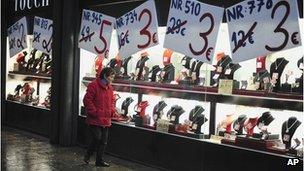Spain's economy contracts as recession fears grow
- Published

The slowdown in consumer spending is hitting Spanish retailers
The Spanish economy has shrunk for the first time in two years, increasing fears the country could be heading for a recession.
The country's economy shrank by 0.3% in the three months to December, after stagnating in the previous quarter.
Household spending fell by 1.1% from the previous quarter, while spending by public bodies dropped by 3.6%.
The country has the highest jobless rate in the EU, with almost one in four people out of work.
Spain's unemployment figure passed the five million mark in the last quarter of 2011.
Figures showed 5.3 million people were out of work at the end of December, up from 4.9 million in the third quarter.
The downbeat fourth-quarter economy figures come even before the impact of new austerity measures unveiled last month by new Spanish Prime Minister Mariano Rajoy.
These include 8.9bn euros in new budget cuts, as well as tax increases designed to raise 6.3bn euros.
RBS economist Nick Matthews said: "Some countries in the eurozone may just avoid a recession, but that may be more difficult for Spain.
"Given the need for fiscal consolidation in the country and the pressure that puts on domestic demand, it's going to be very difficult for Spain to avoid recession."
On Wednesday, figures showed that both Italy and the Netherlands fell into recession in the final quarter of 2011.
Each of their economies contracted by 0.7% in the fourth quarter, the second consecutive quarter of economic contraction.
Germany had its first negative quarter since 2009 with a decline of 0.2%, but the French economy grew by 0.2% - stronger than expected - helped by strong exports.